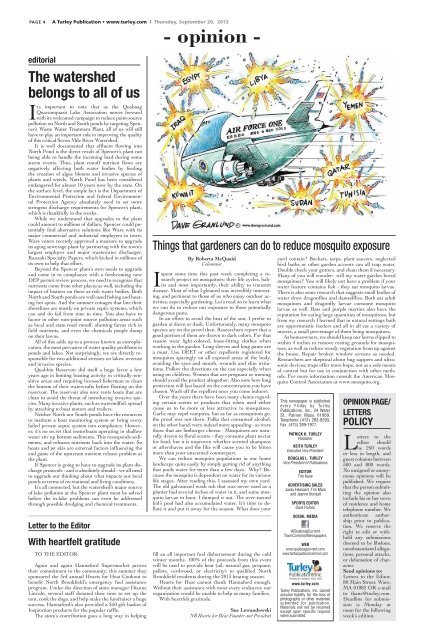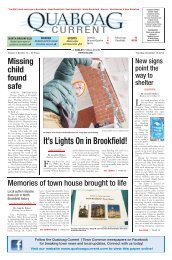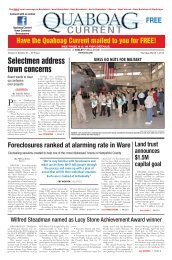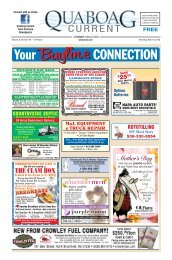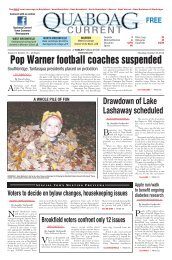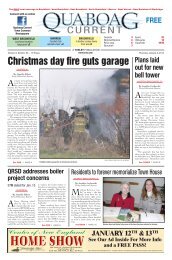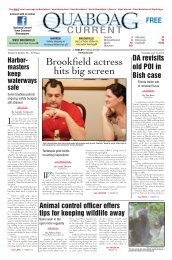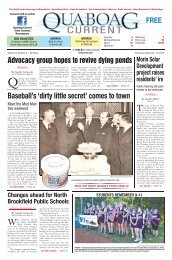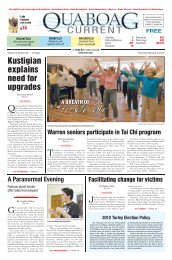September 20, 2012 pdf edition - Quaboag Current
September 20, 2012 pdf edition - Quaboag Current
September 20, 2012 pdf edition - Quaboag Current
You also want an ePaper? Increase the reach of your titles
YUMPU automatically turns print PDFs into web optimized ePapers that Google loves.
PAGE 4 A Turley Publication • www.turley.com I Thursday, <strong>September</strong> <strong>20</strong>, <strong>20</strong>12<br />
- opinion -<br />
editorial<br />
The watershed<br />
belongs to all of us<br />
It’s important to note that as the <strong>Quaboag</strong><br />
Quacumquasit Lake Association moves forward<br />
with its welcomed campaign to reduce point-source<br />
pollution on North and South ponds by targeting Spencer’s<br />
Waste Water Treatment Plant, all of us will still<br />
have to play an important role in improving the quality<br />
of this critical Seven Mile River Watershed.<br />
It is well documented that effl uent fl owing into<br />
North Pond is the direct result of Spencer’s plant not<br />
being able to handle the incoming load during some<br />
storm events. Thus, plant runoff nutrient fl ows are<br />
negatively affecting both water bodies by feeding<br />
the creation of algae blooms and invasive species of<br />
plants and weeds. North Pond has been considered<br />
endangered for almost 10 years now by the state. On<br />
the surface level, the simple fact is the Department of<br />
Environmental Protection and federal Environmental<br />
Protection Agency absolutely need to set more<br />
stringent discharge requirements for Spencer’s plant,<br />
which is thankfully in the works.<br />
While we understand that upgrades to the plant<br />
could amount to millions of dollars, Spencer could potentially<br />
fi nd alternative solutions like Ware with its<br />
major commercial and industrial employers in town.<br />
Ware voters recently approved a measure to upgrade<br />
its aging sewerage plant by partnering with the town’s<br />
largest employer and major wastewater discharger,<br />
Kanzaki Specialty Papers, which kicked in millions of<br />
its own to help that effort.<br />
Beyond the Spencer plant’s own needs to upgrade<br />
and come in to compliance with a forthcoming new<br />
DEP permit review process, we need to recognize that<br />
nutrients come from other places as well, including the<br />
impact of boaters on these at-risk water bodies. Both<br />
North and South ponds are well-used fi shing and boating<br />
hot spots. And the summer cottages that line their<br />
shorelines are mostly on private septic systems, which<br />
can and do fail from time to time. You also have to<br />
factor in other non-point source pollution areas such<br />
as local and state road runoff, abutting farms rich in<br />
fi eld nutrients, and even the chemicals people dump<br />
on their lawns.<br />
All of this adds up to a process known as eutrophication,<br />
the most pervasive of water quality problems in<br />
ponds and lakes. Not surprisingly, we are directly responsible<br />
for two additional stresses on lakes: overuse<br />
and invasive species.<br />
Quabbin Reservoir did itself a huge favor a few<br />
years ago in limiting boating activity in critically sensitive<br />
areas and requiring licensed fi sherman to clean<br />
the bottom of their watercrafts before fl oating on the<br />
reservoir. The reservoir also now rents boats that are<br />
clean to avoid the threat of introducing invasive species.<br />
Many invasive plants, such as watermilfoil, spread<br />
by attaching to boat motors and trailers.<br />
Neither North nor South ponds have the resources<br />
to institute a boat monitoring system or bring every<br />
failed private septic system into compliance. However,<br />
it’s no secret that motorboats operating in shallow<br />
water stir up bottom sediments. This resuspends sediments,<br />
and releases nutrients back into the water. So<br />
boats and jet skis are external factors infl uencing the<br />
end game of the upstream nutrient release problem at<br />
the plant.<br />
If Spencer is going to have to upgrade its plant discharge<br />
protocols - and it absolutely should - we all need<br />
to upgrade our thinking about what impacts our local<br />
ponds in terms of recreational and living conditions.<br />
It’s all connected, but the watershed’s major source<br />
of lake pollution at the Spencer plant must be solved<br />
before the in-lake problems can even be addressed<br />
through possible dredging and chemical treatments.<br />
Letter to the Editor<br />
With heartfelt gratitude<br />
TO THE EDITOR:<br />
Again and again Hannaford Supermarket proves<br />
their commitment to the community; this summer they<br />
sponsored the 3rd annual Hearts for Heat Cookout to<br />
benefi t North Brookfi eld’s emergency fuel assistance<br />
program. Under the direction of store manager Dianne<br />
Lincoln, several staff donated their time to set up the<br />
tent, cook the dogs, and help make the fundraiser a huge<br />
success. Hannaford’s also provided a $50 gift basket of<br />
Inspiration products for the popular raffl e.<br />
The store’s contribution goes a long way in helping<br />
Things that gardeners can do to reduce mosquito exposure<br />
By Roberta McQuaid<br />
Columnist<br />
I<br />
spent some time this past week completing a research<br />
project on mosquitoes: their life cycles, habits<br />
and most importantly, their ability to transmit<br />
disease. Most of what I gleaned was incredibly interesting,<br />
and pertinent to those of us who enjoy outdoor activities,<br />
especially gardening. Let’s read on to learn what<br />
we can do to reduce our exposure to these potentially<br />
dangerous pests.<br />
In an effort to avoid the heat of the sun, I prefer to<br />
garden at dawn or dusk. Unfortunately, many mosquito<br />
species are on the prowl then. Researchers report that a<br />
good portion of them are drawn to dark colors. For that<br />
reason wear light-colored, loose-fi tting clothes when<br />
working in the garden. Long sleeves and long pants are<br />
a must. Use DEET or other repellents registered for<br />
mosquitos sparingly on all exposed areas of the body,<br />
avoiding the eyes and mouth, wounds and skin irritations.<br />
Follow the directions on the can especially when<br />
using on children. Women that are pregnant or nursing<br />
should avoid the product altogether. Also note how long<br />
protection will last based on the concentration you have<br />
chosen. Wash off the repellent once you come indoors.<br />
Over the years there have been many claims regarding<br />
certain scents or products that when used either<br />
cause us to be more or less attractive to mosquitoes.<br />
Garlic may repel vampires, but as far as mosquitoes go,<br />
the proof was not there. Folks that consumed alcohol,<br />
on the other hand, were indeed more appealing - as were<br />
those that ate limburger cheese. Mosquitoes are naturally<br />
drawn to fl oral scents - they consume plant nectar<br />
for food, but it is unproven whether scented shampoos<br />
or aftershaves and the like will cause you to be bitten<br />
more than your unscented counterpart.<br />
We can reduce mosquito populations in our home<br />
landscape quite easily by simply getting rid of anything<br />
that pools water for more than a few days. Why? Because<br />
the mosquito is dependent on water for its various<br />
life stages. After reading this, I assessed my own yard.<br />
The old galvanized wash tub that was never used as a<br />
planter had several inches of water in it, and some mosquito<br />
larvae to boot. I dumped it out. The over-turned<br />
kid’s pool had also accumulated water. It’s time to defl<br />
ate it and put it away for the season. What does your<br />
fi ll an all important fuel disbursement during the cold<br />
winter months. 100% of the proceeds from this event<br />
will be used to provide heat (oil, natural gas, propane,<br />
pellets, cordwood, or electricity) to qualifi ed North<br />
Brookfi eld residents during the <strong>20</strong>13 heating season.<br />
Hearts for Heat cannot thank Hannaford enough.<br />
Without their assistance with most every endeavor, our<br />
organization would be unable to help as many families.<br />
With heartfelt gratitude.<br />
Sue Lewandowski<br />
NB Hearts for Heat Founder and President<br />
yard contain? Buckets, tarps, plant saucers, neglected<br />
bird baths or other garden accents can all trap water.<br />
Double check your gutters, and clean them if necessary.<br />
Many of you will wonder: will my water garden breed<br />
mosquitoes? You will likely not have a problem if your<br />
water feature contains fi sh - they eat mosquito larvae.<br />
There is also some research that suggests small bodies of<br />
water draw dragonfl ies and damselfl ies. Both eat adult<br />
mosquitoes and dragonfl y larvae consume mosquito<br />
larvae as well. Bats and purple martins also have the<br />
reputation for eating large quantities of mosquitoes, but<br />
from my research I learned that in natural settings both<br />
are opportunistic feeders and all in all eat a variety of<br />
insects, a small percentage of them being mosquitoes.<br />
As homeowners, we should keep our lawns clipped to<br />
within 4 inches to remove resting grounds for mosquitoes,<br />
as well as reduce weedy vegetation from up against<br />
the house. Repair broken window screens as needed.<br />
Researchers are skeptical about bug zappers and ultrasonic<br />
devices; traps offer more hope, not as a sole means<br />
of control but for use in conjunction with other methods.<br />
For more information consult the American Mosquito<br />
Control Association at www.mosquito.org.<br />
This newspaper is published<br />
every Friday by Turley<br />
Publications, Inc., 24 Water<br />
St., Palmer, Mass. 01069.<br />
Telephone (413) 283-8393,<br />
Fax (413) 289-1977.<br />
PATRICK H. TURLEY<br />
Publisher<br />
KEITH TURLEY<br />
Executive Vice President<br />
DOUGLAS L. TURLEY<br />
Vice President of Publications<br />
EDITOR<br />
Tim Kane<br />
ADVERTISING SALES<br />
Jacky Haesaert, Tim Mara<br />
and Jeanne Bonsall<br />
SPORTS EDITOR<br />
Dave Forbes<br />
SOCIAL MEDIA<br />
@<strong>Quaboag</strong><strong>Current</strong><br />
TownCommonNewspapers<br />
WEB<br />
www.quaboagcurrent.com<br />
www.tantasquatowncommon.com<br />
www.turley.com<br />
Turley Publications, Inc. cannot<br />
assume liability for the loss of<br />
photographs or other materials<br />
submitted for publication.<br />
Materials will not be returned<br />
except upon specific request<br />
when submitted.<br />
OPINION PAGE/<br />
LETTERS<br />
POLICY<br />
Letters to the<br />
editor should<br />
be 250 words<br />
or less in length, and<br />
guest columns between<br />
500 and 800 words.<br />
No unsigned or anonymous<br />
opinions will be<br />
published. We require<br />
that the person submitting<br />
the opinion also<br />
include his or her town<br />
of residence and home<br />
telephone number. We<br />
authenticate authorship<br />
prior to publication.<br />
We reserve the<br />
right to edit or withhold<br />
any submissions<br />
deemed to be libelous,<br />
unsubstantiated allegations,<br />
personal attacks,<br />
or defamation of character.<br />
Send opinions to:<br />
Letters to the Editor,<br />
80 Main Street, Ware,<br />
MA 01082 OR e-mail<br />
to tkane@turley.com.<br />
Deadline for submission<br />
is Monday at<br />
noon for the following<br />
week’s <strong>edition</strong>.


